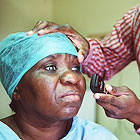Working to Restore Sight in South Africa
Resource type: Grantee Story
In South Africa there are approximately 330,000 blind people, 80% of whom live in rural areas. Cataracts, though preventable and treatable by a simple and inexpensive means, cause blindness among more than 66% of blind people in South Africa. This figure increases to 80% among the indigent population.
The 14 countries that form the Southern Africa Development Community (SADC) region produce only 14 cataract surgeons per year. South Africa produces no more than two per year, and they are all in the private sector. Until 2004, there was no full-time optometrist in the public sector in the Eastern Cape Province. In April 2006, there is only one optometrist serving the entire Province. South Africa does not have a single state-funded ophthalmic training centre.
The Eastern Cape Province, the poorest Province in South Africa, is home to about 7 million people, of whom 52,500 are blind. The Province requires 17,500 cataract surgeries annually to meet the minimum WHO’s vision 2020 programme objective of making cataract surgery accessible at a rate of 2,000 to 3,000 operations per million people per year. Currently, government institutions conduct no more than 3,000 cataract operations per year, leaving an estimated shortfall of 14,500 cataract operations per year.
This ongoing annual shortfall does not address the current backlog of over 35,000 cataract blind people. Critical shortcomings also exist in other areas of vision care and treatment, including surgical treatment of glaucoma, laser treatment of diabetic retinopathy and harvesting and storage of corneas.
Purpose and Impact of the Grant
Atlantic provides support to the Fred Hollows Foundation South Africa to construct a multifunctional eye hospital, Sabona Centre, in the Eastern Cape Province to:
- provide high-volume cataract surgery
- train cataract surgeons
- create a centre of excellence for community eye-health.
Through this grant, Fred Hollows provides approximately 3,000 sight restorative surgeries each year at the Sabona Centre and a further 2,500 operations in the five rural satellite hospitals. The satellites are run by local doctors and nurses trained in cataract surgery at Sabona Centre.
 Sabona Centre trains approximately five general practitioners annually, including those in private practice prepared to do session work in the public hospitals, as cataract surgeons. The programme operates a child eye-health outreach to identify refractive error and provide spectacles at District Clinic level, targeting the estimated 135,000 children of school-going age with refractive error.
Sabona Centre trains approximately five general practitioners annually, including those in private practice prepared to do session work in the public hospitals, as cataract surgeons. The programme operates a child eye-health outreach to identify refractive error and provide spectacles at District Clinic level, targeting the estimated 135,000 children of school-going age with refractive error.
Through the training of general practitioners and ophthalmic technicians, the Sabona Centre project is creating a pool of public service-oriented cataract surgeons who provide an invaluable blindness prevention and sight-restoration service to disadvantaged and vulnerable groups in South Africa. Besides giving sight back to those who otherwise would have been condemned to a life of blindness, the project also provides a catalyst model for training and retaining health professionals for the public sector, to serve the rural poor. The Eastern Cape Provincial Government is providing ZAR70 million (US$12 million) in support of the work of this project.